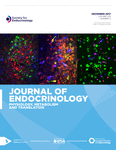Transcriptional regulation of major histocompatibility complex class I gene by insulin and IGF-I in FRTL-5 thyroid cells
- C Giuliani,
- M Saji1,
- I Bucci,
- G Fiore,
- M Liberatore2,
- D S Singer3,
- F Monaco,
- L D Kohn4 and
- G Napolitano
- Unit of Endocrinology, Department of Medicine and Sciences of Aging, University ‘G D’Annunzio’ and Aging Research Center, Ce.S.I., ‘Gabriele D’Annunzio’ University Foundation, Campus Universitario, via Colle dell’Ara, 66013 Chieti, Italy
- 1Arthur G Janes Cancer Center and Richard J Solove Research Institute, Ohio State University, Columbus, Ohio 43210, USA
- 2Unit of Immuno-oncology Aging Research Center, Ce.S.I., ‘Gabriele D’Annunzio’ University Foundation, Chieti-Pescara, Italy
- 3Experimental Immunology Branch, National Cancer Institute, National Institutes of Health, Bethesda, Maryland 20892, USA
- 4Edison Biotechnology Institute and Department of Biomedical Sciences, College of Osteopathic Medicine, Ohio University, Athens, Ohio 45701, USA
- (Requests for offprints should be addressed to C Giuliani; Email: cgiulian{at}unich.it.)
Abstract
Increased major histocompatibility complex (MHC) class I gene expression in nonimmune cell ‘target tissues’ involved in organ-specific diseases may be important in the pathogenesis of autoimmune diseases. This possibility in part evolves from studies of cultured thyrocytes where properties appear relevant to the development of thyroid autoimmune disease. In FRTL-5 rat thyroid cells in continuous culture, hormones and growth factors that regulate cell growth and function specifically decrease MHC class I gene expression. We hypothesized that this could reflect a mechanism to preserve self-tolerance and prevent autoimmune disease. The mechanisms of action of some of these hormones, namely TSH and hydrocortisone, have been already characterized. In this report, we show that IGF-I transcriptionally downregulates MHC class I gene expression and that its action is similar to that of insulin. The two hormones have a complex effect on the promoter of the MHC class I gene, PD1. In fact, they decrease the full promoter activity, but upregulate the activity of deleted mutants that have lost an upstream, tissue-specific regulatory region but still retain the enhancer A region. We show that insulin/IGF-I promotes the interactions of the p50/p65 subunits of NF-κB and AP-1 family members with these two regions, and that the tissue-specific region acts as a dominant silencer element on insulin/IGF-I regulation of promoter activity. These observations may be important to understand how MHC class I gene transcription is regulated in the cells.
- Received in final form 16 February 2006
- Accepted 3 March 2006
- Accepted 13 March 2006
- Made available online as an Accepted Preprint 13 March 2006
- © 2006 Society for Endocrinology











